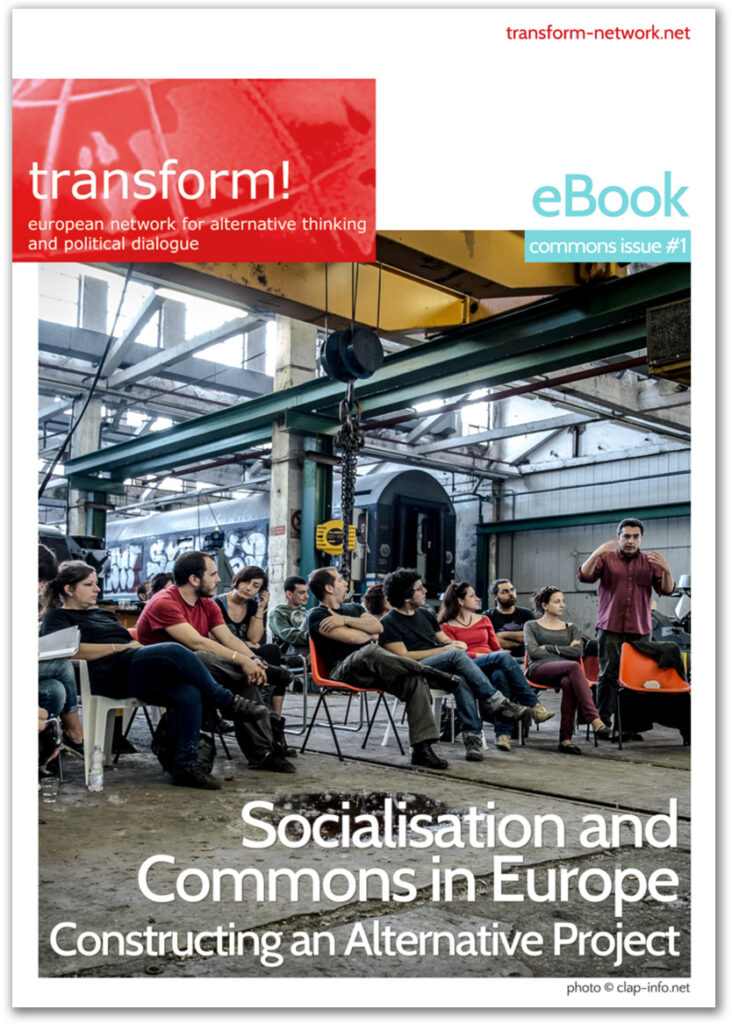We present our first transform! eBook, which deals with the promising topic of the Commons. It is a reiteration of the essential discussions held during a European seminar in Paris in November 2014. You can download the eBook in EPUB (for eBook readers) and PDF format (for printing and everything else) on the right.
The seminar was organised by transform!, the Association pour l’Autogestion, the Workers’ Control Network, Espaces Marx, Fondation Copernic, and Omos under the theme Socialisation and Commons in Europe: How to Construct an Alternative Project. It brought together around 50 actors and researchers from the social and political movement from nine different countries. Among other things, its aim was to bring into the dialogue different experiences of the commons, cooperatives and public services and start creating a coherent narrative in order to decipher what these different experiences can contribute to constructing an alternative project.
A number of issues were debated:
- What relations need to exist between the struggles and the institutions to make these new experiences permanent?
- What can we change here and now by using what already exists?
- What is the public-private link and how does it relate to the commons?
- Do state-owned entities currently act in the interests of the people or of money?
- How does the state relate to constructing commons based on its politics?
- Commons institutions do not exist; the right of ownership alone is legally valid in our society. How can we change this situation that is paralysing the dynamism, actions and creations of the peoples involved in struggles?
Through this eBook, we will try to answer some of these questions by sharing and analysing concrete experiences and will then look at the initial reflections of the researchers on these issues.
This eBook is the first in a series on this issue, in which transform! europe will look in greater depth at the challenges for an alternative project – through European seminars and world social forums, as it is closely involved with the networks addressing these issues.
Table of Contents
Chantal Delmas: Introduction – Socialisation and Commons in Europe: Constructing an Alternative Project
Roberto Musacchio: Cooperativism and Self-management in Italy
Theodoros Karyotis: Self-management as an antagonistic force: Commons-based responses to the Greek structural adjustment
Peter North: Contemporary commoning: A diverse economies perspective
Gigi Malabarba: The Story of RiMaflow: A factory reclaimed by its workers in Milan
Alan Tuckman: The NHS in the UK: The Struggle over Health in Common
Marina Sitrin: The Self-Organizational Seeds Planted by the Occupy Movement
Catherine Samary: Stuck in the past?
Elisabetta Cangelosi: To Begin With, an Initial Attempt at Defining the Commons
Christian Laval: What is the Principle of the Common?
Dario Azzellini: Privatisation, public and commons
Alfonso Gianni: Mutualism Between Tradition and Modernity
Pablo Sanchez: Public services in the age of austerity
Ugo Mattei: First Thoughts for a Phenomenology of the Commons
Marie-Christine Vergiat: Towards new ways of collective appropriation
Benoît Borrits: Co-operative ownership and Common
Pierre Dardot: Self-management, Social Reappropriation and the Commons
Francine Mestrum: Social Protection: It’s up to Us! Redefining Social Protection through ‘Social Commons’
Benoît Borrits & Chantal Delmas: A Political Vision for the Commons
